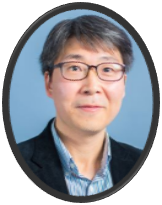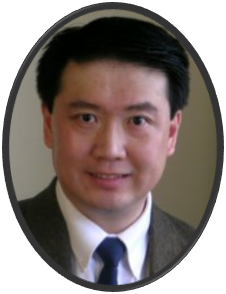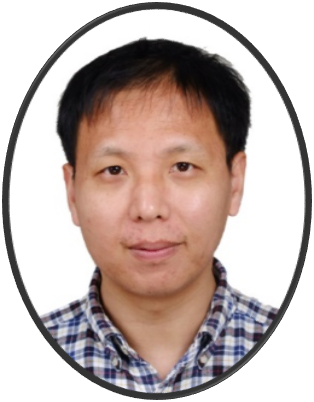
Keynote Speakers
| Prof. Juyang Weng, Brain-Mind Institute and GENISAMA, USA IEEE Life Fellow Biography: Prof. Juyang Weng received the BS degree from Fudan University, in 1982, M. Sc. and PhD degrees from the University of Illinois at Urbana-Champaign, in 1985 and 1989, respectively, all in computer science. He is a former faculty member of Department of Computer Science and Engineering, faculty member of the Cognitive Science Program, and faculty member of the Neuroscience Program at Michigan State University, East Lansing. He was a visiting professor at the Computer Science School of Fudan University, Nov. 2003 - March 2014, and did sabbatical research at MIT, at Media Lab Fall 1999 – Spring 2000; and at Department of Brain and Cognitive Science Fall 2006-Spring 2007 and taught BCS9.915/EECS6.887 Computational Cognitive and Neural Development during Spring 2007. Since the work of Cresceptron (ICCV 1993) the first deep learning neural networks for 3D world without post-selection misconduct, he expanded his research interests in biologically inspired systems to developmental learning, including perception, cognition, behaviors, motivation, machine thinking, and conscious learning models. He has published over 300 research articles on related subjects, including task muddiness, intelligence metrics, brain-mind architectures, emergent Turing machines, autonomous programing for general purposes (APFGP), Post-Selection flaws in “deep learning”, vision, audition, touch, attention, detection, recognition, autonomous navigation, and natural language understanding. He published with T. S. Huang and N. Ahuja a research monograph titled Motion and Structure from Image Sequences. He authored a book titled Natural and Artificial Intelligence: Computational Introduction to Computational Brain-Mind. Dr. Weng is an Editor-in-Chief of the International Journal of Humanoid Robotics, the Editor-in-Chief of the Brain-Mind Magazine, and an associate editor of the IEEE Transactions on Autonomous Mental Development (now Cognitive and Developmental Systems). With others’ support, he initiated the series of International Conference on Development and Learning (ICDL), the IEEE Transactions on Autonomous Mental Development, the Brain-Mind Institute, and the startup GENISAMA LLC. He was an associate editor of the IEEE Transactions on Pattern Recognition and Machine Intelligence and the IEEE Transactions on Image Processing. |
Title of Speech: The First Conscious Learning Algorithm Avoids "Deep Learning" Misconduct
Abstract: From a fruit fly to a human, with many animal species in between, do they share a set of biological mechanisms to regulate the lifelong development of the brains? We have seen very impressive advances in understanding the principles of neuroscience. However, what is still missing is a holistic algorithm that is both broad and deep. By broad, we mean it approximates such mechanisms across a range of species. By deep, we mean that it specifies sufficient details so that the algorithm can be biologically and computationally verified and possibly corrected across a deep hierarchy of scales, from neurotransmitters, to cells, to brain patterns, to behaviors, to intelligence, to consciousness across the time span of a life. This talk outlines such a conscious learning algorithm, the first in the category as far as the presenter is aware of, called Developmental Network 3 (DN-3). All its predecessors, Cresceptron, IHDR, DN-1 and DN-2 were not capable of conscious learning till DN-3. A major extension from DN-2 to DN-3 is that the model starts from a single cell inside the skull so that brain patterning is fully automatic in a coarse to fine way. This biological model has been supported by computational experiments with real sensory data for vision, audition, natural languages, and planning, to be presented during the talk. This first ever algorithm for conscious learning is free from “deep learning” misconduct, including ChatGPT.

Prof. Xiangjie Kong, Zhejiang University of Technology, China IEEE Senior Member & ACM Member Biography: Dr. Xiangjie Kong is currently a Full Professor with the College of Computer Science & Technology, Zhejiang University of Technology (ZJUT), Hangzhou, China. Previously, he was an Associate Professor with the School of Software, Dalian University of Technology (DUT), Dalian, China, where he was the Head of the Department of Cyber Engineering. He is the Founding Director of City Science of Social Computing Lab (The CSSC Lab) (http://cssclab.cn/). He is/was on the Editorial Boards of 6 International journals. He has served as the General Co-Chair, Workshop Chair, Publicity Chair or Program Committee Member of over 30 conferences. Dr. Kong has authored/co-authored over 180 scientific papers in international journals and conferences including IEEE TKDE, ACM TKDD, IEEE TNSE, IEEE TII, IEEE TITS, IEEE NETW, IEEE COMMUN MAG, IEEE TVT, IEEE IOTJ, IEEE TSMC, IEEE TETC, IEEE TASE, IEEE TCSS, WWWJ, etc.. 5 of his papers is selected as ESI- Hot Paper (Top 1‰), and 18 papers are ESI-Highly Cited Papers (Top 1%). His research has been reported by Nature Index and other medias. He has been invited as Reviewers for numerous prestigious journals including IEEE TKDE, IEEE TMC, IEEE TNNLS, IEEE TNSE, IEEE TII, IEEE IOTJ, IEEE COMMUN MAG, IEEE NETW, IEEE TITS, TCJ, JASIST, etc.. Dr. Kong has authored/co-authored three books (in Chinese). He has contributed to the development of 14 copyrighted software systems and 20 filed patents. He has an h-index of 49 and i10-index of 118, and a total of more than 7700 citations to his work according to Google Scholar. He is named in the 2019-2023 world’s top 2% of Scientists List published by Stanford University. Dr. Kong received IEEE Vehicular Technology Society 2020 Best Land Transportation Paper Award, and The Natural Science Fund of Zhejiang Province for Distinguished Young Scholars. He has been invited as Keynote Speaker at 5 international conferences, and delivered a number of Invited Talks at international conferences and many universities worldwide. His research interests include big data, network science, and computational social science. He is a Distinguished Member of CCF, a Senior Member of IEEE, a Full Member of Sigma Xi, and a Member of ACM. |
|
Title of Speech: Mobile Trajectory Generation and Anomaly Analytics: A Knowledge and Data Driven Perspective
Abstract: Mobility trajectory data is of great significance for mobility pattern study, urban computing, and city science. Self-driving, traffic prediction, environment estimation, and many other applications require large-scale mobility trajectory datasets. However, mobility trajectory data acquisition is challenging due to privacy concerns, commercial considerations, missing values, and expensive deployment costs. Nowadays, mobility trajectory data generation has become an emerging trend in reducing the difficulty of mobility trajectory data acquisition by generating principled data. Despite the popularity of mobility trajectory data generation and anomaly analytics, literature surveys on this topic are rare. In this talk, we will introduce and discuss recent advances on mobility trajectory generation and anomaly analytics by artificial intelligence from knowledge-driven and data-driven views.

| Prof. Pascal Lorenz, University of Haute-Alsace, France IEEE Senior Member Biography: Pascal Lorenz received his M.Sc. (1990) and Ph.D. (1994) from the University of Nancy, France. His research interests include QoS, wireless networks and high-speed networks. He is the author/co-author of 3 books, 3 patents and 200 international publications in refereed journals and conferences. He was Technical Editor of the IEEE Communications Magazine Editorial Board, IEEE Networks Magazine, IEEE Transactions on Vehicular Technology, Chair of IEEE ComSoc France, Financial chair of IEEE France, Chair of Vertical Issues in Communication Systems Technical Committee Cluster, Chair of the Communications Systems Integration and Modeling Technical Committee, Chair of the Communications Software Technical Committee and Chair of the Technical Committee on Information Infrastructure and Networking, Chair of IEEE/ComSoc Satellite and Space Communications Technical, IEEE R8 Finance Committee, IEEE R8 Conference Coordination Committee (2023). He is associate Editor for International Journal of Communication Systems (IJCS-Wiley), Journal on Security and Communication Networks (SCN-Wiley) and International Journal of Business Data Communications and Networking, Journal of Network and Computer Applications (JNCA-Elsevier). He is senior member of the IEEE, IARIA fellow and member of many international program committees. He has organized many conferences, chaired several technical sessions and gave tutorials at major international conferences. He was IEEE ComSoc Distinguished Lecturer Tour during 2013-2014. |
Title of Speech: Advanced Architectures of Next Generation Wireless Networks
Abstract: Internet Quality of Service (QoS) mechanisms are expected to enable wide spread use of real time services. New standards and new communication architectures allowing guaranteed QoS services are now developed. We will cover the issues of QoS provisioning in heterogeneous networks, Internet access over 5G networks and discusses most emerging technologies in the area of networks and telecommunications such as IoT, SDN, Edge Computing and MEC networking. We will also present routing, security, baseline architectures of the inter-networking protocols and end-to-end traffic management issues.

| Prof Gyu Myoung Lee, Liverpool John Moores University, UK and KAIST, Korea IEEE Senior Member Gyu Myoung Lee is a professor at the Liverpool John Moores University (LJMU), UK. He is also affiliated with KAIST, Daejeon, Rep. of Korea, as an Adjunct Professor since 2012. Before joining the LJMU in 2014, he worked at the Institut Mines-Telecom from 2008. Until 2012, he was invited to work at ETRI, Rep. of Korea. He worked as a research professor at KAIST, Rep. of Korea and as a guest researcher at NIST, USA, in 2007. His research interests include Internet of Things, digital twin, computational trust, blockchain with privacy preservation, data and AI governance, knowledge centric networking and services considering all vertical services, Smart Grid, energy saving networks, cloud-based big data analytics platform and multimedia networking and services. Prof. Lee has been actively participating in standardization meetings including ITU-T SG 13 and SG20, IETF and oneM2M, etc., and currently serves as a Working Party chair and the Rapporteur of Q16/13 on trustworthy networking and services and Q4/20 on data analytics, sharing, processing and management in ITU-T. He is the Vice-Chair of ITU-T FG-AN and FG-AI4A as well as the Convenor of CG-AIoT and Web3-adhoc. He was also the chair of ITU-T Focus Group on Data Processing and Management (FG-DPM). He has contributed more than 500 proposals for standards and published more than 200 papers in academic journals and conferences. He received several Best Paper Awards in international and domestic conferences and served as a reviewer of IEEE journals/conference papers and an organizer/member of committee of international conferences. He is a Senior Member of IEEE. Prof. Lee received his BS degree in electronic and electrical engineering from Hong Ik University, Seoul, Rep. of Korea, in 1999 and MS, and PhD. degree from KAIST, Daejeon, Rep. of Korea, in 2000 and 2007, respectively. |  |
Title of Speech: Computational Trust: Trustworthy Decentralized Data Ecosystems
Abstract: Data will be essential to support AI-based solutions with human interactions and for behavioral analytics. The future ICT ecosystem will require data-driven networks and services in a decentralized manner with user-centric approaches. Recently, however, many researchers have noted that there are security, privacy and trust concerns, although the new ecosystem provides many benefits and conveniences in our daily lives. In order to cope with the negative effects of technological solutions for autonomy, as well as their applications and services, the need to build a trustworthy decentralized data ecosystem is emphasized. Based on this, this talk introduces the concepts and characteristics of a trustworthy data ecosystem and presents technical enablers to achieve computational trust. It then identifies key challenges for realizing a trustworthy decentralized data ecosystem and discusses future research on computational trust with a holistic view, considering the future digital economy. It also addresses recent progress in international standardization with some challenging issues.


